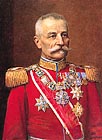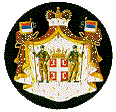King Petar I Karadjordjevic
|
PETAR I KARADJORDJEVICH King of Serbia 1903-1918 King of the Kingdom of Serbs, Croats and Slovenians (November 18, 1918 - 1921) |
|
|
After coup d’etat in May 1903, when the last ruler of the Obrenovich dynasty was killed, the Karadjordjevich Family came to the throne of Serbia, and stayed there for the following four decades.
Peter Karadjordjevich attended schools in Begrade and Geneva, and finished the Military School of Saint Sire in Paris, and as a lieutenant also the Higher Mlitary School of Metz, France. He fought on the side of France in the Franco-Prussian war, and also took part in the Bosnian-Herzegovinian uprising, under the name of Petar Mrkonyich. He unsuccessfully offered cooperation to Prince Milan Obrenovich.
He ascended the Serbian throne at the age of fifty nine, as a mature person. Peter understood that desire of self-ruling and absence of hearing of one’s people’s wishes brought the disaster to his predecessors from the Obrenovich Family. Peter chose the system of the constitutional monarchy, and freedom of parliament and parties. His decision to be a democrat ruler sticking to the constitutional rules, as well as truthful and loyal carrying out of the decision, solved many internal issues in Serbia. Energy that previously had been wasted on fruitless internal battles among parties and dynasties, now was directed towards work and strengthening of the state, as well as preparations for carrying out big national and state tasks.
At the same time Serbia experienced a rapid economical progress. Railways were built, water transport activated, trade and crafts developed, foundations of industry laid, all of which contributed that the state of Serbia fully gets included into European and world economy.
The ruling period of King Peter I is marked by three liberation and victorious wars: the First Balkan War in 1912, the Second Balkan War in 1913, and World War I from 1914-1918. The secret conspiracy organization "Black Hand" led by army officers, was still very active. After coup d’etat in May 1903, it had grown stronger and had a substantial impact on the political life of the country. It was under its pressure that King Peter abdicated on June 22,1914, transferring his royal duties to the crown-prince Alexander.
All of the Serbian people cherish the memory of King Peter I Karadjordjevich as a beloved and righteous ruler, who went together with his army through the most difficult experiences of World War I: crossing of Albania and exile in Greece. Since World War I brought liberation to all Slav peoples who had lived in Austrian-Hungarian Empire, King Peter became the first King of the Serbs, Croats and Slovenians in their joint country.
He died in 1921. |
|

